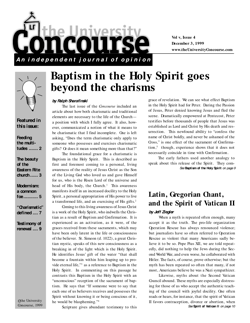What does ‘charismatic’ really mean?
by Adam Tate
I enjoyed Carole M. Brown’s article “The charismatic and traditional dimensions of the life of faith,” but I disagree with much of it. Brown’s thesis is that “it is impossible to be orthodox without embracing both the charismatic and traditional dimensions of the faith.” But she uses the terms “charism” and “charismatic,” rather loosely, equivocating their meanings throughout the article. Sometimes she uses the term “charismatic” to refer to the Catholic charismatic renewal and gifts such as tongues, while at other times the term denotes a spiritual milieu in Christianity. The result is a good deal of ambiguity, which leads to confusion. If I have read her correctly, the conclusion one must reach by the end of the article is that one cannot be a true Catholic without being a member of the charismatic renewal. Brown denies that one has to be a “‘card carrying member’ of the charismatic movement,” but how can she square this with her contention that one has to embrace the “charismatic dimension” of the faith in order to be considered orthodox? She seems to wants to say that one has to be open to the charismatic gifts and even to seek them out in order to be an orthodox Catholic. I challenge Brown to cite some examples of her conclusion from Church doctrine and the Fathers of the Church. Obviously, she cannot do so because neither the Church nor the Fathers made such claims. Brown defines “charismatic” too narrowly. Her general argument can be saved if she agrees to a broader definition of charismatic.
I think that when the word “charismatic” appears in Church documents and papal speeches, it usually refers to a dynamic lived experience of the Faith, prompted by the Holy Spirit. The charismatic gifts can be a part of the experience, but do not have to be. There are some in the Church who denounce the charismatic revival of the twentieth century as a fraud or even as demonic. I do not believe either proposition. Nor do I hold that any Catholic should reject a gift of the Holy Spirit. If God gives you the charismatic gifts, then you should use them. Brown is correct in this regard.
As saints and theologians throughout the history of the Church have taught, the Catholic Faith is not simply belief in certain intellectual propositions “but in those realities they express.” (CCC170) Nor is Faith simply a belief in a spiritual reality. The fullness of God’s revelation is the person of Christ. Cardinal Ratzinger has put it poignantly: “Christian faith is more than the option in favour of a spiritual ground to the world; its central formula is not ‘I believe in something,’ but ‘I believe in Thee.’ It is the encounter with the human being Jesus, and in this encounter it experiences the meaning of the world as a person.”1 Thus the Faith is dynamic and personal. Faith involves both the intellect and the will. Just as in our human friendships love deepens with a greater knowledge of the other, so it should be with God. The sure way to kill a friendship is to lose interest in the other person and refuse to learn more about him. The sin of sloth threatens our relationships with each other and with God. All forms of Catholic piety, not only traditional forms, risk becoming rigid and meaningless due to our own laziness. The challenge, of course, is to practice the awareness of God’s presence. We must be conscious of our relationship with Christ, of His love for us, and seek to further our relationship by cooperating with God’s grace at every moment. Accordingly, the call to holiness is a demanding one.
I think that when John Paul II referred to “charismatic” in his 1998 Pentecost address, he was discussing the aspect of conversion of the heart (after all, the pope was addressing a crowd of Catholics, only some of whom were charismatics). In this case, “charismatic” means feeling the excitement and energy of the Faith. The charismatic aspect of the Faith is that awareness of the Faith that makes it a lived experience and influences our daily behavior. The charismatic dimension manifests in our lives the doctrines of our Faith that we hold intellectually. The charismatic gifts can contribute to the lived experience of Catholicism. For many including myself, the Catholic Faith had never come alive until they experienced the charismatic renewal. “Charismatic,” as it appears in Church documents, is not limited to the charismatic gifts, however. The seven Isaian gifts of the Holy Spirit, which all Catholics receive at Confirmation, are the normative means by which the Holy Spirit enlivens our Faith and deepens our relationship to Christ. One does not have to practice the charismatic gifts to feel the pull of conversion in his heart and to fully experience the Faith.
Adam Tate (‘94), his wife Eugenie (Lightfoot, ‘95), and their son Nathan live in Cullman, Alabama.
- Joseph Cardinal Ratzinger, Introduction to Christianity. (San Francisco, 1990), 47. ↑


